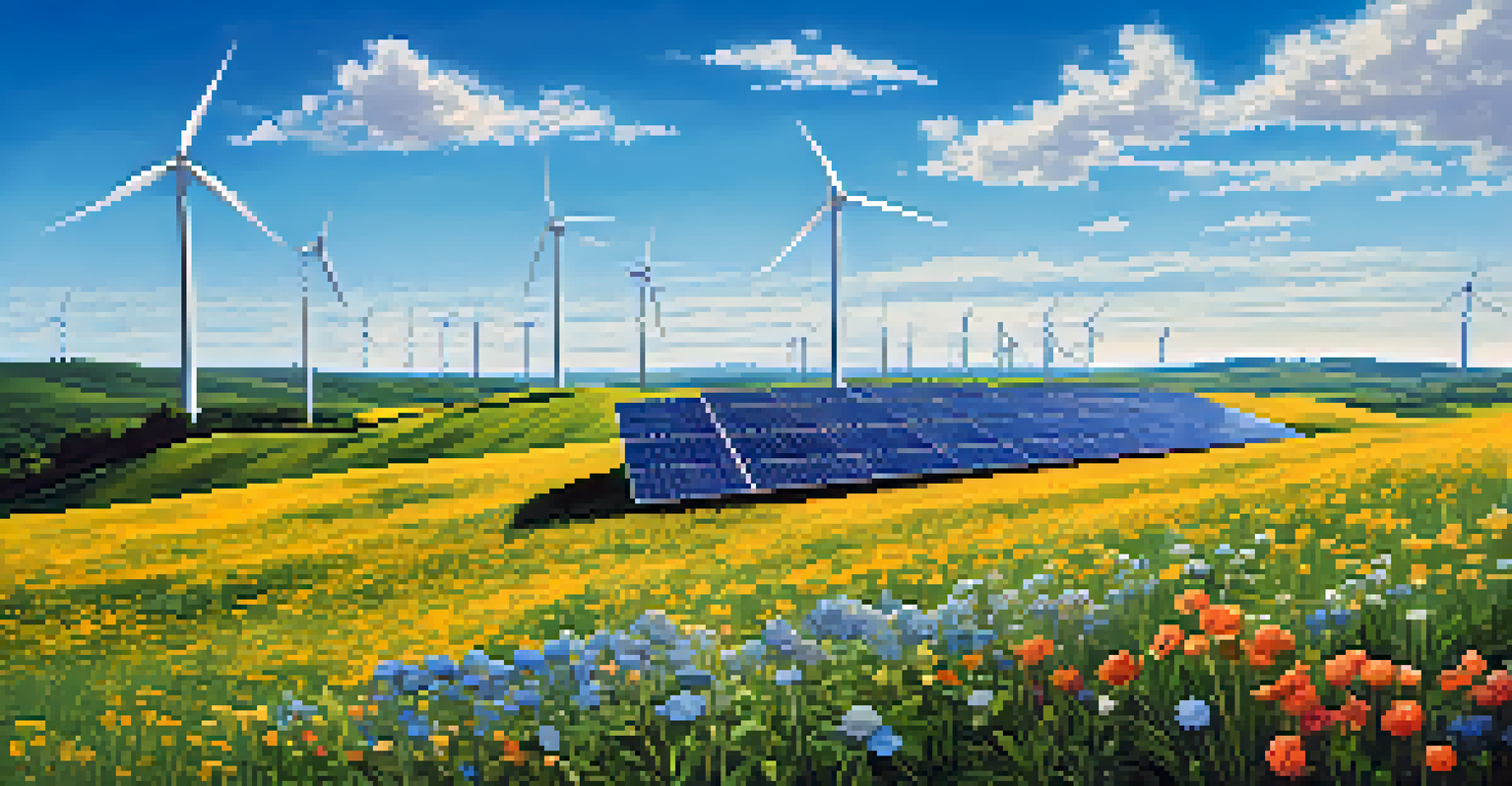Eco-Friendly Careers: The Future of Sustainable Work

The Rise of Eco-Friendly Careers in Today’s Job Market
As environmental concerns grow, so does the demand for eco-friendly careers. Many industries are now prioritizing sustainability, leading to a surge in jobs focused on reducing environmental impact. This shift is not just a trend; it's a necessary response to the climate crisis that affects us all.
The greatest threat to our planet is the belief that someone else will save it.
Individuals are increasingly seeking work that aligns with their values, making eco-friendly careers more attractive. From renewable energy to sustainable agriculture, these roles offer the chance to make a tangible difference. It’s like choosing to plant a tree rather than just watching it grow from afar.
As a result, we’re seeing a diversification in job opportunities, with companies actively seeking professionals skilled in sustainability practices. This evolution in the job market signals a promising future where careers contribute to the well-being of our planet.
Understanding What Eco-Friendly Careers Entail
So, what exactly are eco-friendly careers? These roles are primarily centered around minimizing environmental impact and promoting sustainability in various sectors. Think of them as the superheroes of the job world, fighting against pollution and waste while championing renewable resources.

From environmental scientists to green architects, these positions encompass a wide array of responsibilities. They often involve research, design, and implementation of sustainable practices. Imagine working every day to ensure that buildings not only look good but also consume less energy and produce less waste.
Growing Demand for Eco-Friendly Jobs
The shift towards sustainability is creating a surge in eco-friendly careers across various sectors.
Ultimately, eco-friendly careers are about creating solutions that benefit both people and the planet. They focus on innovative ways to meet human needs without depleting natural resources, making them integral to a sustainable future.
Key Sectors Embracing Eco-Friendly Career Paths
Several sectors are leading the charge in eco-friendly career development. Renewable energy, for instance, is a powerhouse of job creation, with roles ranging from solar panel installers to wind turbine technicians. These jobs not only pay well but also contribute significantly to reducing carbon footprints.
Sustainability is no longer about doing less harm. It's about doing more good.
Another booming sector is sustainable agriculture, where professionals work to develop farming practices that conserve resources and protect ecosystems. Picture a farmer using advanced techniques to grow food without harmful pesticides—it's a win-win for both the environment and consumers.
Moreover, sectors like waste management and green construction are also expanding rapidly. By focusing on recycling, composting, and sustainable building materials, these fields offer numerous opportunities for those looking to make a positive impact on the environment.
Skills Needed for Eco-Friendly Careers
To thrive in eco-friendly careers, certain skills are particularly valuable. Technical skills related to environmental science, engineering, and renewable technologies are crucial. Think of these as the toolbox you need to build a more sustainable future.
However, soft skills are just as important. Communication, problem-solving, and teamwork play a significant role in effectively implementing sustainable practices. It’s about bringing people together to create innovative solutions, much like a conductor leading an orchestra to create beautiful music.
Diverse Skills for Sustainable Careers
Successful eco-friendly professionals need a blend of technical and soft skills to implement sustainable practices effectively.
Lastly, a passion for the environment and a commitment to lifelong learning are essential. The field of sustainability is constantly evolving, so staying informed about new technologies and practices is key to remaining relevant and impactful.
Educational Paths to Eco-Friendly Careers
If you’re considering a career in sustainability, various educational paths can lead you there. Many universities now offer degrees in environmental science, sustainable design, and renewable energy. These programs provide a solid foundation for understanding the complexities of environmental issues.
Additionally, certifications in specific areas like LEED (Leadership in Energy and Environmental Design) and environmental management can enhance your qualifications. These credentials are like badges of honor that showcase your expertise and commitment to sustainability.
Moreover, internships and hands-on experience in eco-friendly projects can be invaluable. They not only bolster your resume but also allow you to apply what you've learned in real-world situations, making you a more competitive candidate in the job market.
The Impact of Eco-Friendly Careers on Communities
Eco-friendly careers do more than just benefit the environment; they also positively impact communities. By focusing on sustainable practices, professionals help create healthier living conditions, reducing pollution and improving air quality. Imagine walking through a neighborhood filled with green spaces and clean parks—this is the kind of community that eco-friendly careers can help build.
These careers also contribute to economic growth by creating jobs and fostering innovation. As companies adopt sustainable practices, they often need more employees to implement these changes, leading to a ripple effect that boosts local economies. It's like planting seeds of opportunity that can grow into fruitful careers.
Positive Community Impact of Careers
Eco-friendly careers not only benefit the environment but also contribute to healthier communities and economic growth.
Furthermore, eco-friendly careers often involve community engagement, educating the public about sustainability practices. This interaction fosters a culture of environmental stewardship, encouraging individuals to take action in their own lives, ultimately creating a more informed and proactive community.
Looking Ahead: The Future of Eco-Friendly Careers
As we look to the future, eco-friendly careers are poised to expand even further. With increasing awareness of climate change and environmental issues, more organizations are likely to prioritize sustainability. This shift indicates a growing recognition of the importance of eco-friendly work in securing a better future for our planet.
Emerging technologies such as artificial intelligence and blockchain are also expected to play a role in sustainability. Professionals who can leverage these technologies to enhance eco-friendly practices will be in high demand. Picture a world where advanced tech helps us optimize energy consumption and reduce waste—this is the future of sustainable work.

In conclusion, the landscape of eco-friendly careers is vibrant and full of opportunities. By choosing a path in this field, you're not just securing a job; you're becoming part of a movement that strives for a healthier planet and a sustainable future.